世界上最好的新概念笔记之第三课“ Matterhorn man”资料
- 格式:docx
- 大小:51.05 KB
- 文档页数:7
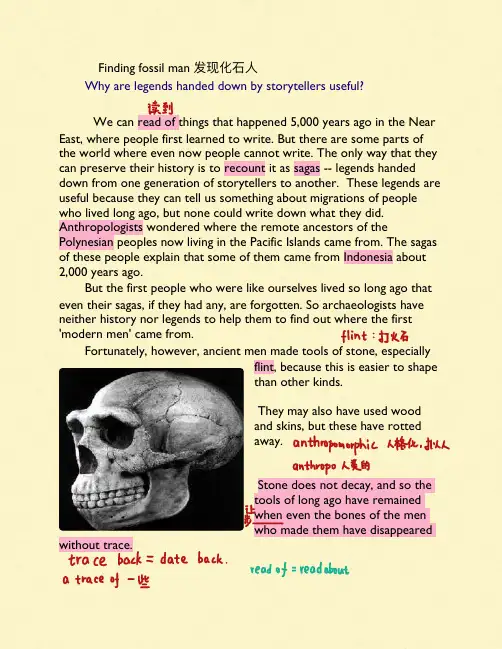
Finding fossil man 发现化⽯石⼈人 Why are legends handed down by storytellers useful? We can read of things that happened 5,000 years ago in the Near East, where people first learned to write. But there are some parts of the world where even now people cannot write. The only way that they can preserve their history is to recount it as sagas -- legends handed down from one generation of storytellers to another. These legends are useful because they can tell us something about migrations of people who lived long ago, but none could write down what they did. Anthropologists wondered where the remote ancestors of the Polynesian peoples now living in the Pacific Islands came from. The sagas of these people explain that some of them came from Indonesia about 2,000 years ago. But the first people who were like ourselves lived so long ago that even their sagas, if they had any, are forgotten. So archaeologists have neither history nor legends to help them to find out where the first 'modern men' came from. Fortunately, however, ancient men made tools of stone, especiallyflint, because this is easier to shapethan other kinds.They may also have used wood and skins, but these have rottedaway. Stone does not decay, and so thetools of long ago have remained when even the bones of the men who made them have disappearedwithout trace. 读到flint 打⽕火⽯石anthropomorphic ⼈人格化拟1anthropo ⼈人类的让步⼀一⼀一trace backdate back read of read abouta trace of ⼀一些resound u叙述 Polynesian adj.波利利尼⻄西亚(中太平洋之⼀一群岛)的 Indonesia n. 印度尼⻄西亚 我们从书籍中可读到5,000 年年前近东发⽣生的事情,那⾥里里的⼈人最早学会了了写字。
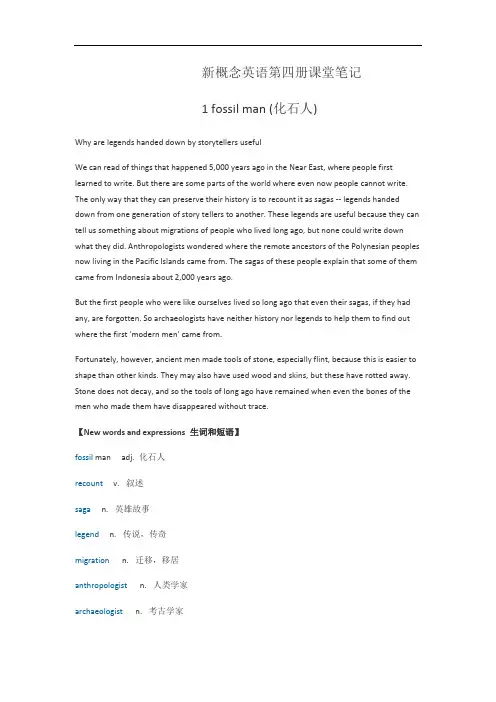
新概念英语第四册课堂笔记1 fossil man (化石人)Why are legends handed down by storytellers usefulWe can read of things that happened 5,000 years ago in the Near East, where people first learned to write. But there are some parts of the world where even now people cannot write. The only way that they can preserve their history is to recount it as sagas -- legends handed down from one generation of story tellers to another. These legends are useful because they can tell us something about migrations of people who lived long ago, but none could write down what they did. Anthropologists wondered where the remote ancestors of the Polynesian peoples now living in the Pacific Islands came from. The sagas of these people explain that some of them came from Indonesia about 2,000 years ago.But the first people who were like ourselves lived so long ago that even their sagas, if they had any, are forgotten. So archaeologists have neither history nor legends to help them to find out where the first 'modern men' came from.Fortunately, however, ancient men made tools of stone, especially flint, because this is easier to shape than other kinds. They may also have used wood and skins, but these have rotted away. Stone does not decay, and so the tools of long ago have remained when even the bones of the men who made them have disappeared without trace.【New words and expressions 生词和短语】fossil man adj. 化石人recount v. 叙述saga n. 英雄故事legend n. 传说,传奇migration n. 迁移,移居anthropologist n. 人类学家archaeologist n. 考古学家ancestor n. 祖先Polynesian adj.波利尼西亚(中太平洋之一群岛)的Indonesia n. 印度尼西亚flint n. 燧石rot n. 烂掉【课文注释】down 把...传下去例句:Many old legends were handed down from generation by mouth.许多古老的传说都是一代一代口传下来了。
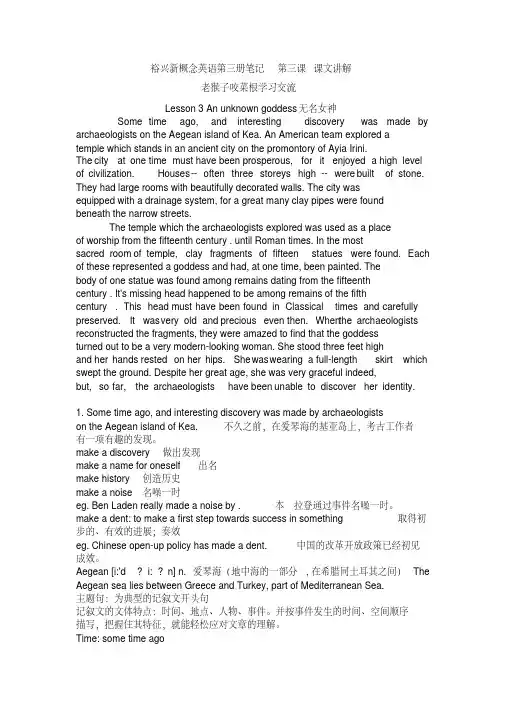
裕兴新概念英语第三册笔记第三课课文讲解老猴子咬菜根学习交流Lesson 3 An unknown goddess 无名女神Some time ago, and interesting discovery was made by archaeologists on the Aegean island of Kea. An American team explored atemple which stands in an ancient city on the promontory of Ayia Irini.The city at one time must have been prosperous, for it enjoyed a high level of civilization. Houses -- often three storeys high -- were built of stone. They had large rooms with beautifully decorated walls. The city wasequipped with a drainage system, for a great many clay pipes were foundbeneath the narrow streets.The temple which the archaeologists explored was used as a placeof worship from the fifteenth century . until Roman times. In the mostsacred room of temple, clay fragments of fifteen statues were found. Each of these represented a goddess and had, at one time, been painted. Thebody of one statue was found among remains dating from the fifteenthcentury . It's missing head happened to be among remains of the fifthcentury . This head must have been found in Classical times and carefully preserved. It was very old and precious even then. When the archaeologists reconstructed the fragments, they were amazed to find that the goddessturned out to be a very modern-looking woman. She stood three feet highand her hands rested on her hips. She was wearing a full-length skirt which swept the ground. Despite her great age, she was very graceful indeed,but, so far, the archaeologists have been unable to discover her identity.1. Some time ago, and interesting discovery was made by archaeologistson the Aegean island of Kea. 不久之前,在爱琴海的基亚岛上,考古工作者有一项有趣的发现。
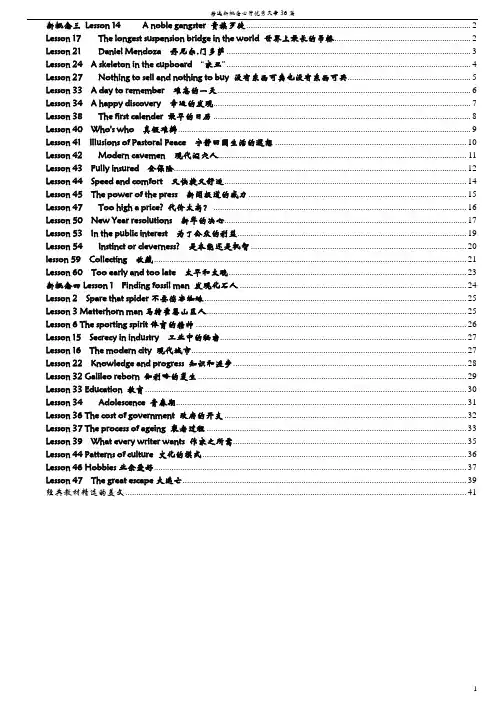
新概念三Lesson 14 A noble gangster 贵族歹徒 (2)Lesson 17The longest suspension bridge in the world 世界上最长的吊桥 (2)Lesson 21Daniel Mendoza 丹尼尔.门多萨 (2)Lesson 24 A skeleton in the cupboard“家丑” (3)Lesson 27Nothing to sell and nothing to buy 没有东西可卖也没有东西可买 (4)Lesson 33 A day to remember难忘的一天 (4)Lesson 34 A happy discovery幸运的发现 (5)Lesson 38The first calender 最早的日历 (5)Lesson 40Who's who真假难辨 (6)Lesson 41Illusions of Pastoral Peace宁静田园生活的遐想 (7)Lesson 42Modern cavemen 现代洞穴人 (7)Lesson 43Fully insured全保险 (8)Lesson 44Speed and comfort又快捷又舒适 (9)Lesson 45The power of the press新闻报道的威力 (10)Lesson 47Too high a price? 代价太高? (11)Lesson 50New Year resolutions新年的决心 (11)Lesson 53In the public interest为了公众的利益 (12)Lesson 54Instinct or cleverness? 是本能还是机智 (13)lesson 59Collecting收藏 (14)Lesson 60Too early and too late太早和太晚 (15)新概念四Lesson 1Finding fossil man 发现化石人 (16)Lesson 2Spare that spider不要伤害蜘蛛 (16)Lesson 3 Matterhorn man马特霍恩山区人 (16)Lesson 6 The sporting spirit体育的精神 (17)Lesson 15Secrecy in industry工业中的秘密 (17)Lesson 16The modern city 现代城市 (18)Lesson 22Knowledge and progress 知识和进步 (18)Lesson 32 Galileo reborn 伽利略的复生 (19)Lesson 33 Education 教育 (19)Lesson 34 Adolescence 青春期 (20)Lesson 36 The cost of government 政府的开支 (21)Lesson 37 The process of ageing 衰老过程 (21)Lesson 39What every writer wants 作家之所需 (22)Lesson 44 Patterns of culture 文化的模式 (23)Lesson 46 Hobbies业余爱好 (24)Lesson 47The great escape大逃亡 (25)经典教材精选的美文 (26)新概念三Lesson 14 A noble gangster 贵族歹徒pay large sums of money than have their life work destroyed by gangsters.Six hundred years ago, Sir Johan Hawkwood arrived in Italy with a band of soldiers and settled near Florence.city-states were a t w a r w i t h each other, Hawkwood used to hire his soldiers to princes who were willing to pay the high price he demanded. I n t i m e s o f peace, when business was bad, Hawkwood and his men would march into a city-state and, after b u r n i n g d o w n a few farms, would o f f e r t o go away if protection money was paid to them. Hawkwood m a d e l a r g e s u m s o f m o n e y in this way. I n s p i t e o f t h i s, the Italians regarded him as a sort of hero. When he died a t t h e a g e o f eighty, the Florentines gave him a state funeral and had a pictured painted which was dedicated t o t h e m e m o r y o f 'the most valiant soldier and most notable leader, Signor Giovanni Haukodue.' 曾经有一个时期,芝加哥的店主和商行的老板们不得不拿出大笔的钱给歹徒以换取"保护"。
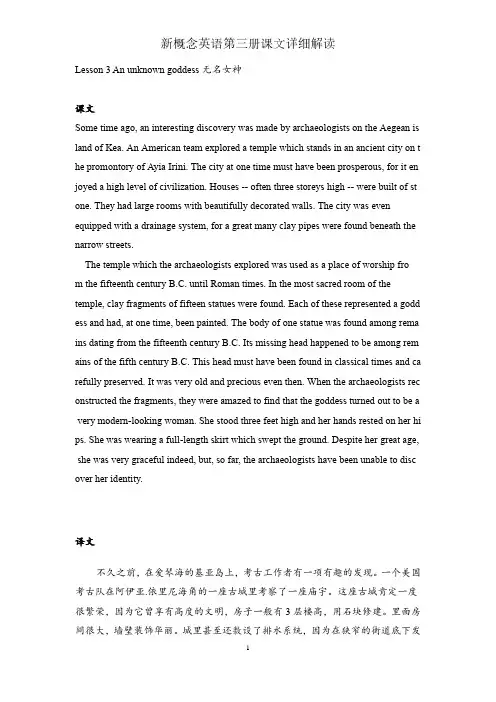
Lesson3 An unknown goddess无名女神课文Some time ago,an interesting discovery was made by archaeologists on the Aegean is land of Kea.An American team explored a temple which stands in an ancient city on t he promontory of Ayia Irini.The city at one time must have been prosperous,for it en joyed a high level of civilization.Houses -- often three storeys high -- were built of st one.They had large rooms with beautifully decorated walls.The city was even equipped with a drainage system,for a great many clay pipes were found beneath the narrow streets.The temple which the archaeologists explored was used as a place of worship from the fifteenth century B.C.until Roman times.In the most sacred room of the temple,clay fragments of fifteen statues were found.Each of these represented a godd ess and had,at one time,been painted.The body of one statue was found among rema ins dating from the fifteenth century B.C.Its missing head happened to be among rem ains of the fifth century B.C.This head must have been found in classical times and ca refully preserved.It was very old and precious even then.When the archaeologists rec onstructed the fragments,they were amazed to find that the goddess turned out to be a very modern-looking woman.She stood three feet high and her hands rested on her hi ps.She was wearing a full-length skirt which swept the ground.Despite her great age, she was very graceful indeed,but,so far,the archaeologists have been unable to disc over her identity.译文不久之前,在爱琴海的基亚岛上,考古工作者有一项有趣的发现。
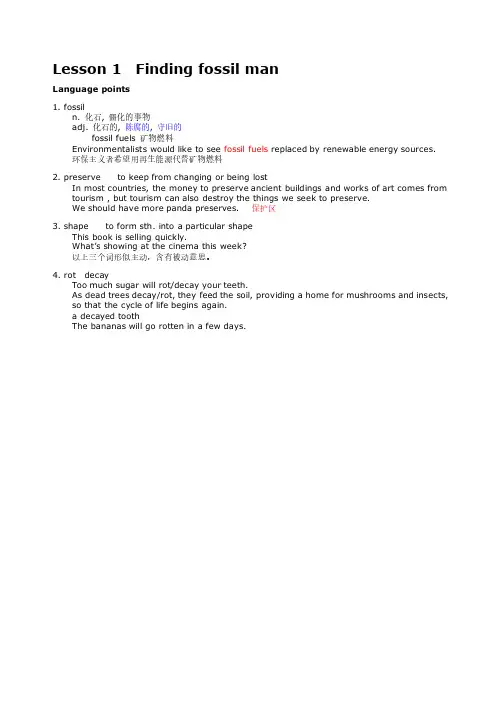
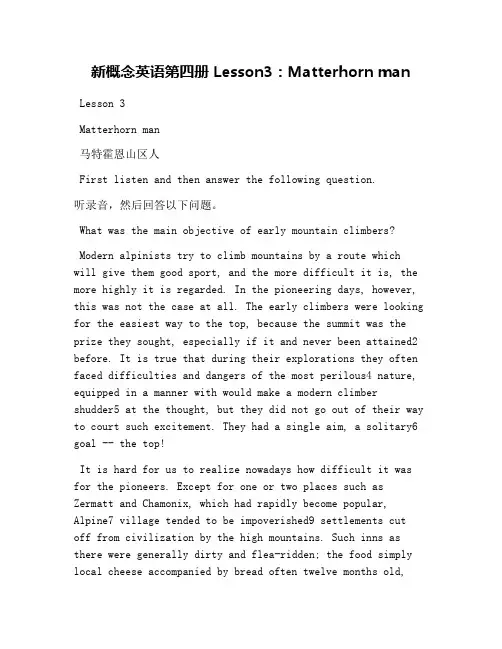
新概念英语第四册 Lesson3:Matterhorn man Lesson 3Matterhorn man马特霍恩山区人First listen and then answer the following question.听录音,然后回答以下问题。
What was the main objective of early mountain climbers?Modern alpinists try to climb mountains by a route whichwill give them good sport, and the more difficult it is, the more highly it is regarded. In the pioneering days, however, this was not the case at all. The early climbers were looking for the easiest way to the top, because the summit was the prize they sought, especially if it and never been attained2 before. It is true that during their explorations they often faced difficulties and dangers of the most perilous4 nature, equipped in a manner with would make a modern climber shudder5 at the thought, but they did not go out of their way to court such excitement. They had a single aim, a solitary6 goal -- the top!It is hard for us to realize nowadays how difficult it was for the pioneers. Except for one or two places such as Zermatt and Chamonix, which had rapidly become popular, Alpine7 village tended to be impoverished9 settlements cutoff from civilization by the high mountains. Such inns as there were generally dirty and flea-ridden; the food simply local cheese accompanied by bread often twelve months old,all washed down with coarse wine. Often a valley boasted no inn at all, and climbers found shelter wherever they could -- sometimes with the local priest (who was usually as poor as his parishioners), sometimes with shepherds or cheese-makers. Invariably the background was the same: dirt and poverty, and very uncomfortable. For men accustomed to eating seven-course dinners and sleeping between fine linen11 sheets at home, the change to the Alps must have very hard indeed.WALTER UNSWORTH Matterhorn ManNew words and expressions 生词和短语Matterhornn. 马特霍恩峰(阿尔卑斯山之一,在意大利和瑞士边境)alpinistn. 登山运动员pioneerv. 开辟,倡导;n. 先锋,开辟者summitn. 顶峰attain1v. 到达perilousadj. 危险的shudderv. 不寒而栗courtv. 追求solitaryadj. 的impoverish8v. 使贫困Alpineadj. 阿尔卑斯山的 flea-riddenadj. 布满跳蚤的coarseadj. 粗劣的boastv. 自恃有parishionern. 教区居民shepherdn. 牧羊人linen。
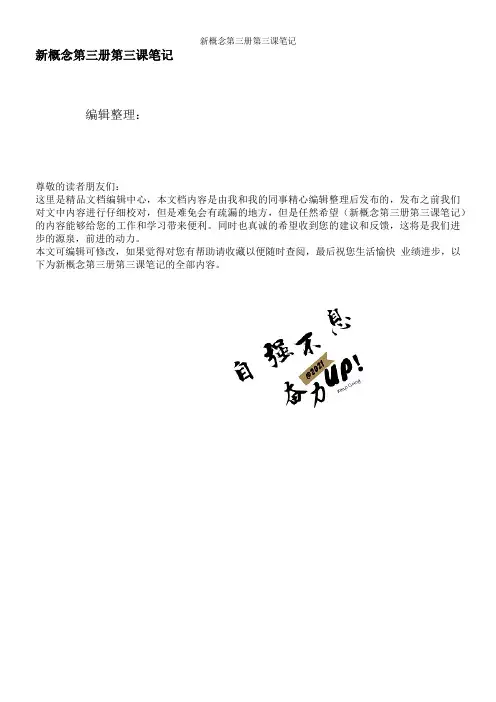
新概念第三册第三课笔记编辑整理:尊敬的读者朋友们:这里是精品文档编辑中心,本文档内容是由我和我的同事精心编辑整理后发布的,发布之前我们对文中内容进行仔细校对,但是难免会有疏漏的地方,但是任然希望(新概念第三册第三课笔记)的内容能够给您的工作和学习带来便利。
同时也真诚的希望收到您的建议和反馈,这将是我们进步的源泉,前进的动力。
本文可编辑可修改,如果觉得对您有帮助请收藏以便随时查阅,最后祝您生活愉快业绩进步,以下为新概念第三册第三课笔记的全部内容。
Lesson3 An unknown goddess 无名女神Some time ago ,an interesting discovery was made by archaeologists on the Aegean island of Kea.An American team explored a temple which stands in an ancient city on the promontory of Ayia Irini. The city an one time mast have been prosperous,for it enjoyed a high level of civilization 。
House_often three storeys high_were built of stone .They had large rooms with beautifully decorated walls。
The city was even equipped with a drainage ,for a great many clay pipes were found beneath the narrow streets。
The temple which the archaeologists explored was used as a place of worship from the fifteenth century B.C.until Roman times .In the most sacred room of the temple ,clay fragments of fifteen statue were found . Each of these represented a goddess and had ,at one time ,been painted .The body of one statue was found among remains dating from the fifteenth Century B.C,Its missing head happened to be among remains of the fifth century B。

世界上最好的新概念笔记之第三课“Matterhornman”资料Lesson 3 Matterhorn man-Matterhorn['m?t?:,h?:n]n.马特洪峰(阿尔卑斯山峰之一,位于瑞士与意大利之间的边境)New words and expressions1.alpinist['?lp?n?st]n. 登山家/登山运动员(高水平的攀爬)-climber['kla?m?]n.1.攀缘植物2.攀高枝者(=social climber) 3.登山者/攀岩者4.爬杆脚扣/铁钉助爬器-mountaineer[ma?nt?'n??] n登山者vi .climb mountains for pleasure as a sport-alps[?lps] n. 阿尔卑斯山脉/山-alpine['?l pa?n]adj.1.阿尔卑斯山的/居民的 2.生长于树木线以上的/高山生长的3. 具有阿尔卑斯人种特征的2.pioneer[pa??'n??]n.1.先驱/开拓者2.拓荒者vt.1.开辟2.首创/倡导3.拓荒-pioneering[pa??'n??r??]adj. 开创性的/首创的Yu Minhong pioneered XDF in 1993, and eventually becamea pioneer in the foreign languages training realm.3.summit['s?m?t]n.1.政府领导会议/首脑会议=summit meeting (国家之间)元首级会谈/峰会2.最高水平/阶层/最大程度3.顶点(山/山丘)vt.到达……山顶-peak[pi?k]n.1.峰值2.鼎盛时期3.最高水平/阶层/最大程度4.顶点5.一个V形6.(帽子等的)帽舌/遮檐v.1.(使)达到最高峰 2.(使)达到最大量 3.变消瘦peak and pine 变得消瘦且憔悴adj. 1.最高/最大量的2.高峰的peak hours 高峰时间peak season 旺季The scenery ['si?n?r?]风景;舞台布景is at the peak of the mountain.无限风光在顶峰。
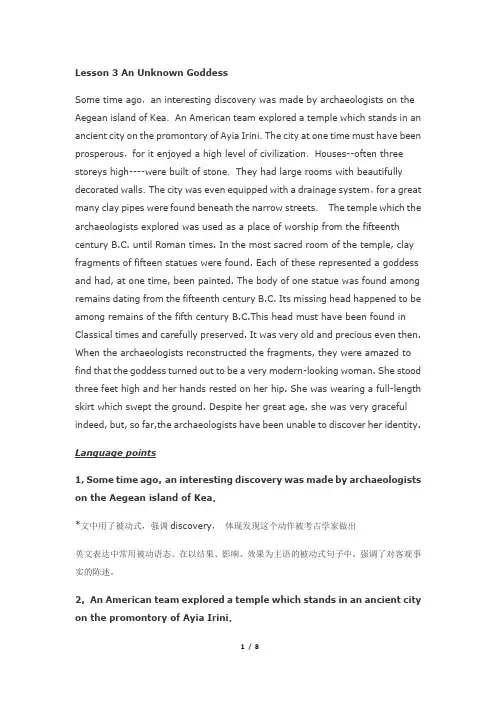
Lesson 3 An Unknown GoddessSome time ago,an interesting discovery was made by archaeologists on the Aegean island of Kea.An American team explored a temple which stands in an ancient city on the promontory of Ayia Irini.The city at one time must have been prosperous,for it enjoyed a high level of civilization.Houses--often three storeys high----were built of stone.They had large rooms with beautifully decorated walls.The city was even equipped with a drainage system,for a great many clay pipes were found beneath the narrow streets.The temple which the archaeologists explored was used as a place of worship from the fifteenth century B.C. until Roman times. In the most sacred room of the temple, clay fragments of fifteen statues were found. Each of these represented a goddess and had, at one time, been painted. The body of one statue was found among remains dating from the fifteenth century B.C. Its missing head happened to be among remains of the fifth century B.C.This head must have been found in Classical times and carefully preserved. It was very old and precious even then. When the archaeologists reconstructed the fragments, they were amazed to find that the goddess turned out to be a very modern-looking woman. She stood three feet high and her hands rested on her hip. She was wearing a full-length skirt which swept the ground. Despite her great age, she was very graceful indeed, but, so far,the archaeologists have been unable to discover her identity.Language points1, Some time ago,an interesting discovery was made by archaeologists on the Aegean island of Kea.*文中用了被动式,强调discovery,体现发现这个动作被考古学家做出英文表达中常用被动语态。
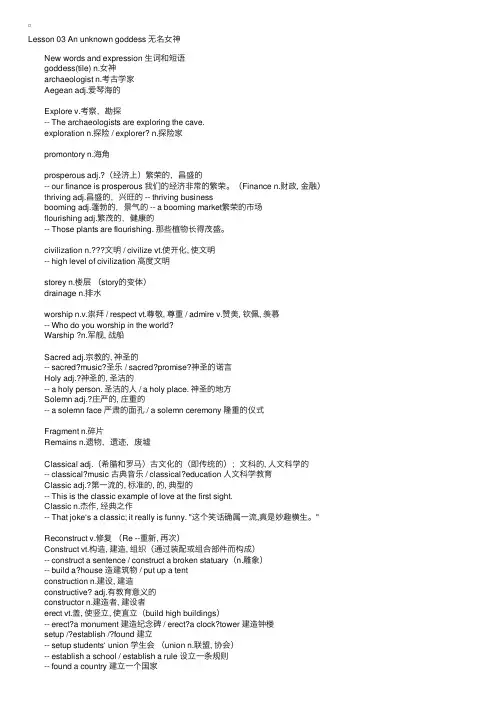
Lesson 03 An unknown goddess ⽆名⼥神 New words and expression ⽣词和短语 goddess(tile) n.⼥神 archaeologist n.考古学家 Aegean adj.爱琴海的 Explore v.考察,勘探 -- The archaeologists are exploring the cave. exploration n.探险 / explorer? n.探险家 promontory n.海⾓ prosperous adj.?(经济上)繁荣的,昌盛的 -- our finance is prosperous 我们的经济⾮常的繁荣。
(Finance n.财政, ⾦融) thriving adj.昌盛的,兴旺的 -- thriving business booming adj.蓬勃的,景⽓的 -- a booming market繁荣的市场 flourishing adj.繁茂的,健康的 -- Those plants are flourishing. 那些植物长得茂盛。
civilization n.⽂明 / civilize vt.使开化, 使⽂明 -- high level of civilization ⾼度⽂明 storey n.楼层(story的变体) drainage n.排⽔ worship n.v.祟拜 / respect vt.尊敬, 尊重 / admire v.赞美, 钦佩, 羡慕 -- Who do you worship in the world? Warship ?n.军舰, 战船 Sacred adj.宗教的, 神圣的 -- sacred?music?圣乐 / sacred?promise?神圣的诺⾔ Holy adj.?神圣的, 圣洁的 -- a holy person. 圣洁的⼈ / a holy place. 神圣的地⽅ Solemn adj.?庄严的, 庄重的 -- a solemn face 严肃的⾯孔 / a solemn ceremony 隆重的仪式 Fragment n.碎⽚ Remains n.遗物,遗迹,废墟 Classical adj.(希腊和罗马)古⽂化的(即传统的);⽂科的, ⼈⽂科学的 -- classical?music 古典⾳乐 / classical?education ⼈⽂科学教育 Classic adj.?第⼀流的, 标准的, 的, 典型的 -- This is the classic example of love at the first sight. Classic n.杰作, 经典之作 -- That joke‘s a classic; it really is funny. "这个笑话确属⼀流,真是妙趣横⽣。
新概念英语第四册第3课:Matterhorn manLesson 3 Matterhorn man马特霍恩山区人听录音,然后回答以下问题。
What was the main objective of early mountain climbers?Modern alpinists try to climb mountains by a route which will give them good sport, and the more difficult it is, the more highly it is regarded. In the pioneering days, however, this was not the case at all. The early climbers were looking for the easiest way to the top, because the summit was the prize they sought, especially if it and never been attained before. It is true that during their explorations they often faced difficulties and dangers of the most perilous nature, equipped in a manner with would make a modern climber shudder at the thought, but they did not go out of their wayto court such excitement. They had a single aim, a solitary goal -- the top!现代登山运动员总想找一条能够给他们带来运动乐趣的路线来攀登山峰。
XDF新概念第3册完全笔记(连载)有新内容 lesson30FOX做了一些小小的调整(内部资料)Lesson1 A puma at large课文精讲1 puma 美洲狮2 spot 看出,发现同义词: see,catch sight of , pick out , recognize3 hunt 追捕,追猎hunt forrun after追求seek / pursuade追寻chase追赶search搜寻某处为找到某物4 corner使走投无路5 trail n.一串,一系列v.follow6 cling : hold tightly粘cling to 粘在.....上stick 粘住stick to坚持sticky 粘的cling--clung--clung7 convince 使确信, 使明白convince sb ( of sth ) make sb feel certain ,cause sb to realizeconfirm : provide evidence for the truth or correctness of ( a report, an opinion,etc) ; establish the truth of 证实,证明(报告,意见)的正确性,确认8 somehow : by some means , in some way, for some reason unknow somewhat : a li ttle9 at large : (1)(of a crimial , animal) free , not confirmed(2) in great detail , throughly(3)(用于名词后)as a whole, in gernal10 on the spot (1)马上,立刻(2)在场,在现场11 assemble 聚集,把某些人召集在一起hoard 大量的贮存amass 积聚( 主要用于诗和文学作品中)12 take sth seriously 认真对待13 leave behind (1) cause (signs of one's actions,an event,etc) to remain(2) fail or forget to bring or take14 complain of 抱怨15 in the possession of / in possession of 为(某人)所有/ (某人) 拥有(某物)16 feel obliged to investigate感到有必要调查feel obliged to / be obliged to感到有必要(做某事)oblige sb (with sth) /oblige sb (by doing sth)17 go on for several weeks持续好几周18 in the quiet country在宁静的乡村补充19 accumulate : gradually get or gather together an increasing number or quantity of sth ; get sth in this way20 extraordinary : beyond what is ordinaryextraordinarily : adv.21 blackberry黑莓22 print 痕迹Lesson2 thirteen quals one课文精讲1 equal等于与......相匹敌be equal to 有能力......2 raise 筹款,募捐提高饲养供养种植招募提出发出3 torchlight 电筒光4 always现在进行时与频度副词always,constantly,continally等搭配表示说话人带有的感情色彩5 one or another 某种,这样或那样one reason or anotherone way or another6 get enough money 筹集足够的钱7 have something done 找某人来做某事have the church repairedhave the plane repairedhave hair cut某人所遭受的意外某情况(主语必须是发出动作的人)He had his wallet stolen.8 used to 过去常常 ......, 现在已经不再做9 however用于口语,主要用在句首.用在作文中,最好用在句中句尾,要用逗号隔开neverthelessnonetheless10 start惊跳,惊吓11 before ....才12 armed with 配备上,武装上armed with the torch13 recognized sb as 认出某人是regard sb as / think of sb as 认为某人是treat sb as 以....待某人have on sb as把某人尊为14 night after night 一夜又一夜day after day year after year week after week bus after bus15 as well 在句尾= too 主要用于肯定句still用在句首用逗号隔开, 报是转折表示转折“虽然如此,但是”16 get used to ,be used to, get accustomed to, be accustomed to习惯于get表示渐进的过程be 表示习惯了的状态补充17 in prep.(1)与表示惊奇,恐惧,失望,生气等感情色彩的名词搭配,在句中做状语in surprisein angerin disappointin dismay(2)“以,用”in Englishin redin ink(3)表示状态、情况、处境in troublein tearsin good/bad orderin good repairin debtin good / bad healthin the bad moodin bedinpoverty / luxuryin a favor of excitment18 be grateful for / be thankful for 为......表示感谢19 take the trouble to do something不辞劳苦地做某事I am grateful for the trouble you have taken for me.20 still 作连接副词= just the same ,even though , in spite of that 仍然yet 但是,然而It's raining , still I must go out.This picture is not too vabulable, still I like it.I have failed, yet I shall try again.lesson3 An unknown goddness课文精讲1 stand = lie, situate(vt.), locate(vt.)A great tree stands on the mout.2 for 引导原因状语从句,表示对主句的附加说明和解释because引导原因状语从句,重点突出原因3 at one time = once 曾经,一度4enjoyed a high level of civilization享有高度文明5 with ...6 beautifully decorated 过去分词做定语,表示被动意义They had large rooms with beautifully decorated walls.房间很大,墙壁装饰华丽.7 beneath the narrow streets = under the narrow streets作介词时beneath = under 在... ... 正下方under还有" 在进行中" 的意思under controlunder discussionunder repairbelow 在下方强调斜下方8 be used as / be used to be 把...... 用做为9 date from / date back to开始于, 起源于10 happen to (v.) 碰巧还有两种表达:It happens / happened thatAs it happens / happened that碰巧, 偶然happen on + n. / pron.偶然发现11 reconstruct : put together, restore12 amazed : very much surprised表示吃惊的程度surprised < astonished < amazed < astounded13 to find ... / to discover ... / to realize ... 发觉.......14 turn out ( to be)证明是......还可以用:It turned out that...据证明as it turned out正如事后证明或证实的那样, 果不其然15 rest on = depend on = lean on 倚放, 放置His hands rested on my shoulder.16 despite / in spite of 都是prep. 接名词或动名词17 to one's surprise , with one's surprise 使某人惊讶的是......不同在: to one's surprise 可做独立状语,而且主语不必是人with one's surprise 不能独立使用,而且主语必须是人相同的用法还有to one's disappointment, to one's satisfaction, to one's delightto one's dismay;with one's disappointment,with one's satisfaction, with one's delight, with one's dismay.18 sacred 神圣的religious 宗教的, 关于宗教的frightening令人害怕的19 conserve = keep from wasted, damaged,lost,destroyed保留maintain维持, 保养20 at this distance ( of / in time ) 时隔已久beforehand = in advance 事先补充21 drainage 排水, 放水; 排水系统drain system 排水系统22 archaelogist考古学家23 promontory海角24 storey 楼层同音词story 故事25 full--length: not shortened; of the expected lengtha full--length skirt : a skirt that reaches the ancklesLesson 4 The double life of Alfred BloggsVocabulary1 manual: physical <---->mental2 collarwhite collar ( do mental work )blue collar ( do manual work)( get) hot under the collar怒气冲天3 sacrifice 牺牲: to give up for good purpose~ one's life for country~ timemake many ~s4 privilege : advantage好处special right特权sacrifice one's ~give sb the ~ of doing sthprivileged荣幸的5 dustman清洁工6 overalls工作服7 secrect秘密keep secrect保密保密还有3 种说法(1)It is between you and me.(2) I'll keep it to myself.(3) confidential 机密的in secrect私下里= secrectly,in private, privatelyin the secrect知道内情8 status = social position社会地位形近词statue 雕像,雕塑课文精讲1 people who do manual work =>blue-collar workerpeople who work in offices, people who do mental work =>white-collar worker 2 far more money多许多钱far =much副词, 起加强语气的作用3 refer to ... as = regard ... as 把......看作/ 称作为I always refer to him as a bookworm.4 for the simple reason =>for引导原因状语从句for the reason that 比because正式, for the reason that 多用于正式语句, 而because 多用在口语中5 human nature人性6 such...that...that引导同位语从句,进一步补充说明such的涵义Such is human nature, that a great many people are often willing to sacrifice higher pa y for the privilege of becoming white-collar workers.7 be willing to = be ready to心甘情愿做 ......8 give rise to, lead to,cause=result in 引起,惹起The bad conditions have given rise to a lot of crimes.9 in case of万一, 以防in the case of 至于,就......而言Stealing is no shame in case of him.You should ensure your house in case of fire.10 too embrassed to say太尴尬而没有说明=be ashamed of10 get marriedmarry v. 强调动作时He married the girl.表示状态get / be married表达“和某人结婚已经多长时间了”be married to sb11 simply = only, just, ...and no more. adv.修饰told12 dressed in a smart black suit 形容词短语表达一种状态= wearing a smart black suit13 changed (back) into 换上,(换回)14 Before returning home = Before he returned home如果运用动名词形式,动名词的主语必须是主句的主语15 she never will = she will never discover the secrect.在省略句中never 用在助动词前16 half as much as 是......的一半多half / a quarter/ three times as ... as ...... as +(adj. / adv.)+ as ...是......的几倍... times + (adj.的比较级/ adv.的比较级)比......多几倍17 is well worth the loss of moneywell 起加强语气作用, 修饰worthDifficulties in exercise1 当直接宾语比较长或者是个从句时, 通常放在间接宾语后, say 除外I explained to him the impossibilty of granting(答应) this request.He confessed(坦白) to me that he had fallen asleep during the meeting.2 worth + n./ 动名词His suggestion is worth considering.3 illustrate 阐释,说明4 gain获利,赢得(经过努力)~ time ~reputationfee(为专业服务支付的)费用the doctor's feethe lawer's feepayment (formal) (商业信贷)付的费用wages (体力劳动者的)工资salary (白领阶层的)薪水5 pay back偿还,报复reward 酬劳compensate for = make up for 弥补more than compensate for = is well worth the loss of Lesson 5 The FactsVocabulary1 edit v.编辑edition n编辑editorial a.编辑的,主编的n.社论2 extreme 极端走极端go to extreme(s)3 statistics数据4 journalist报社,杂志社的记者reporter电视台的记者correspondent电台记者,通讯员5 palace宫殿6 publish = print (vt.) go to press (vi.Phr)7 fire v.解雇= dismiss (formal)= sack ( 俚语)If you do it wrong again, you'll be sacked .8 originally最初地,原始地Text1 instruct sb to do sth= tell sb formally to do sth2 on = about 强调课题更专一3 When the article arrived= When the editor received the article4 refuse to publish it拒绝发表(它)refuse严厉拒绝decline婉言拒绝repudiate(formal)断然拒绝5 instructing 现在分词做定语,补充说明fax6 set out to do = decide & try to doHe set out to make his first 1,000,000 in 5 years.set about doing = start doing sth (no passive)7 take sb a long time to do sth某人花费很长时间做某事8 two more faxes = another two faxes9 fail to = couldn'tThe journalist failed to reply.10 reluctantly = unwilling11 as it had or been written = in its originally way12 倒装句小结A not only 位于句首,倒装not only ...but (also)...Not only had the poor man been arrested,but he had been sent into prison as well.B 否定词位于句首,倒装常用的否定词有never, seldom. rarely, little,hardly,scarcely, no where,no sonnerC 含only 的状语位于句首,倒装Only then did he realize that he had made a mistake.Only when a great deal more information has been obtained, will it be possible to plan a trip.D含not的短语位于句首,倒装not for a moment,not in the leastnot for an instantnot untilE 含no的副词短语位于句首,倒装at no timein no wayin no senseby no meansin no caseon no conditionon no accountunder no circumstancesF so ,such位于句首,倒装13 he had at last been allowed= he had at last been permitted= he had asked for pemission14 while 和现在分词搭配,做时间状语,表示正在做某事的过程中可用while引导的时间状语从句替换He had been arrested while counting the 1084 steps ...= ... while he was counting ...15 现在分词the step leading to the president's palace16 fifteen-foot 做前置定语,用单数Difficulties倒装句(见课文讲解)lesson 6 Smash-and-grabVocabularysmash: break sth into pieces violentlyThe dishes was smashed in the floor.smash into 猛撞,猛冲.猛击2 grab:seize suddenlycatch: get hold of sth / sb suddenly and violentlyseize 强调抓住抓到的结果grasp: 掌握hold:抓牢,抓紧He grabed me by the arm.Fear seize her.3 background背景on the background of sthbackground informationa man of excellent background4 scramble vi. creep quicklyclimb vt.爬mount vt.登上(山)5 fantastic: very greatlargewonderful6 arcade7 jewellery8 velvet9 headlight10 blare11 raid12 ashtrayText1 介词短语修饰shopsThe shoe shop in my neighborhood was just opening.2 同位语从句Mr. Taylor, the owner of a jewellery shop was admiring a new display.3 with 的复合结构本课重点A. 宾语和宾语补足语在逻辑上是主谓关系用动词-ing 形式B.宾语和宾语补足语在逻辑上是动宾关系用过去分词形式C. 描述当时的情况用形容词, 副词,或介词短语. 表示宾语的状况.D. 表达事情将要发生用动词的不定式toeg.She stood there with her hands resting on her hips.He ran into the room with his face covered with tears.With his homework finished he felt happy.He used to sleep with all windows open.He went out with his hat on.With the meeting over, we went home.He came in with a knife in his hand.Two others with black stockings over faces jumped out.With a lot of homework to do, he can't go to the cinema.with放在句首或句尾, 做状语, 表示行为方式, 原因, 或伴随状况.with 放在名词后, 修饰限定该名词eg. a thief with stocking over his facea room with the windows open4 come to + n.到达come to a stopcome to an endcome to a decisioncome to an agreementcome to an understandingcome to famecome to success5 atat the butcher'sat the backer'sat the greengrocer'sat the chemist's6 help oneself to自便My roommate helped herself to my clothes without asking me.7 too busy to notice any pain = concentrated one's mind that did not feel any pain8 at a fantasic speed = at a tremendous speed = at a high( full ) speed = with great speed9 hunderds of thousands of dollars worth of jewel 价值上百万美元的珠宝10 前缀构词法本课重点(1) dis-A. dis- + adj.agreeable --disagreeable content --discontentgraceful ---disgraceful satisfactory ---dissatisfactoryB. dis- + n.agreement ----disagreement honest ---dishonestability ---disability grace ----disgraceC. dis-表示除去.解除名词前加上dis-转化为动词courage --- discourage root --- disroot mask --- dismask burden --- disburden (2) ill-后面接以l开头的形容词legal --illegal logical -- illogicalliterate -- illterate legible -- illegible(3) im- 后面接以b, m, p, 开头的形容词mortal -- immortal moral --- immoral(4) ir-用在以r开头的形容词前rational -- irrational resistble -- irresistible (5) in- 用在以其他字母开头的形容词前correct -- incorrect accurate -- inaccurate (6) un- 后面接形容词或动词"不" happy -- unhappy" 无" condition -- uncondition表示" 为" 主要用在过去分词前decided -- undecided finished -- unfinished 用在动词前表示做相反的动作lock -- unlock tie -- untie pack -- unpackDifficlties in excersize1 on one's way to在......的路上on the way to在......的路上He is on the way to become a lawer.= He is on his way to become a lawer. warn sb out of one's way提醒某人让路in one's way挡路2 名词前有修饰词时,修饰词的语序时先形容词后名词3 speed强调加快动作和工作的进程speed upaccelerate加速v.reverse 倒车v.4 overdressed穿着讲究的5 overlooked俯瞰6 as it happened这类事的发生7 hurl用力投掷8 project发射= send uplesson 7 Mutilated ladiesVocabulary1 mutilate 毁伤,残害vt. 通常用做被动语态He was mutilated in the accident, and now has only one leg.You have already mutilated the novel by making such changes.mutilation切断,残缺不全n.2 chew咀嚼v.A lot of people love chewing gums.Don't bite off more than one can chew.chew the fat聊天chewed up(俚) worried, anxiousDon't get chewed up about your examation.3 microwave oven微波炉microswich微型开关microfilm微缩胶卷microscope显微镜microphone microsecond百万分之一秒microbiology微生物学4 safekeeping妥善保管n.keep sth safe v.phr.---safekeeping n.do evil v.phr. --- evildoing n.make trouble v.phr. --- troublemaking n.5 identify v.鉴定identity n.身份identification n. 认明, 确认6 spodeswoman女发言人Notes on the text1 段首用疑问句引发读者的兴趣和注意力2 rescuesave 救(性命)salvage(在水中捞)救rescue 抢救(东西)Hundereds of people went to help the plane rescue .3 whiter than white 在英国常见的广告用语,在这里译为damaged, mutilated4 make mistakes like this 犯这种错误5 team组织a team called Mutilated Ladies which deals with claims from people who fed their mone y to a machine or to their dogscalled Multitated Ladies 做team的定语, 表达被动意义。
Lesson 03 An unknown goddess 无名女神New words and expression 生词和短语goddess(tile) n.女神archaeologist n.考古学家Aegean adj.爱琴海的Explore v.考察,勘探-- The archaeologists are exploring the cave.exploration n.探险/ explorer? n.探险家promontory n.海角prosperous adj.?(经济上)繁荣的,昌盛的-- our finance is prosperous 我们的经济非常的繁荣。
(Finance n.财政, 金融)thriving adj.昌盛的,兴旺的-- thriving businessbooming adj.蓬勃的,景气的-- a booming market繁荣的市场flourishing adj.繁茂的,健康的-- Those plants are flourishing. 那些植物长得茂盛。
civilization n.???文明/ civilize vt.使开化, 使文明-- high level of civilization 高度文明storey n.楼层(story的变体)drainage n.排水worship n.v.祟拜/ respect vt.尊敬, 尊重/ admire v.赞美, 钦佩, 羡慕-- Who do you worship in the world?Warship ?n.军舰, 战船Sacred adj.宗教的, 神圣的-- sacred?music?圣乐/ sacred?promise?神圣的诺言Holy adj.?神圣的, 圣洁的-- a holy person. 圣洁的人/ a holy place. 神圣的地方Solemn adj.?庄严的, 庄重的-- a solemn face 严肃的面孔/ a solemn ceremony 隆重的仪式Fragment n.碎片Remains n.遗物,遗迹,废墟Classical adj.(希腊和罗马)古文化的(即传统的);文科的, 人文科学的-- classical?music 古典音乐/ classical?education 人文科学教育Classic adj.?第一流的, 标准的, 著名的, 典型的-- This is the classic example of love at the first sight.Classic n.杰作, 经典之作-- That joke‘s a classic; it really is funny. "这个笑话确属一流,真是妙趣横生。
Lesson 3 Matterhorn man-Matterhorn['mætə:,hɔ:n]n.马特洪峰(阿尔卑斯山峰之一,位于瑞士与意大利之间的边境)New words and expressions1.alpinist['ælpɪnɪst]n. 登山家/登山运动员(高水平的攀爬)-climber['klaɪmə]n.1.攀缘植物 2.攀高枝者(=social climber) 3.登山者/攀岩者4.爬杆脚扣/铁钉助爬器-mountaineer[maʊntɪ'nɪə] n登山者vi .climb mountains for pleasure as a sport-alps[ælps] n. 阿尔卑斯山脉/山-alpine['æl paɪn]adj.1.阿尔卑斯山的/居民的 2.生长于树木线以上的/高山生长的3. 具有阿尔卑斯人种特征的2.pioneer[paɪə'nɪə]n.1.先驱/开拓者 2.拓荒者vt.1.开辟 2.首创/倡导3.拓荒-pioneering[paɪə'nɪərɪŋ]adj. 开创性的/首创的Yu Minhong pioneered XDF in 1993, and eventually became a pioneer in the foreign languages training realm.3.summit['sʌmɪt]n.1.政府领导会议/首脑会议=summit meeting (国家之间)元首级会谈/峰会2.最高水平/阶层/最大程度3.顶点(山/山丘)vt.到达……山顶-peak[piːk]n.1.峰值 2.鼎盛时期 3.最高水平/阶层/最大程度 4.顶点5.一个V形6.(帽子等的)帽舌/遮檐v.1.(使)达到最高峰 2.(使)达到最大量 3.变消瘦peak and pine 变得消瘦且憔悴adj. 1.最高/最大量的 2.高峰的peak hours 高峰时间peak season 旺季The scenery ['siːnərɪ]风景;舞台布景is at the peak of the mountain.无限风光在顶峰。
-top[tɒp]n.1.任何东西上部[top to toe 从头到脚] 2.一切东西最顶部3.[美][棒球](一局比赛的)前半局=the first half上半场4.最高水平/阶层/最大程度at the top of5.[船舶学]桅楼/桅杆台6.陀螺玩具7.外套(女)8.[美国俚语](尤指马戏团的)大帐篷v.1.超过 2.不接触的跳过/越过 3.在…...最高点;组成/构成了……顶部4.比……强/优秀5.提供盖(或顶) ;给…加盖(或顶)6.到达/升到……顶部7.【体育】击球的上部/击(球)使向前旋转8.切断/截去顶端to top a tall tree9.成为最终的结果10.结束/完结They topped off their dinner with a cognac ;top the evening with champagne4.attain[ə'teɪn]v.1.经过努力得到/到达 2.出乎意料的发现/找到/获得-attain one’s goal=realize['riːəlaɪz]=attain to 达到/获得/实现-conquer['kɒŋkə]v.1.克制/武力镇压conquer one's desires 2.武力掠夺3.征服/打败conquer your fears conquer a country- get to到达-arrive at/in到达-attain one’s goal=realize= attain to=attain-attain the top/peak/summit达到顶点-attainment[ə'teɪnm(ə)nt]=accomplishment [ə'kʌmplɪʃm(ə)nt; ə'kɒm-]n. 1.达到/完成……的行为 2. [常作复数]技能/学识-the attainment of independence his attainment of puberty was delayed by malnutrition形近词:-obtain[əb'teɪn] vt/vi1. 获得How did you obtain the visa?-sustain[sə'steɪn] v.1.延长(空间/时间) 2.经受(伤痛/疾病) 3.提供营养(物)4.保持/维持5.确认/证明…合法6.用……使稳固/证实/加强-detain[dɪ'teɪn] vt. 1.拘留; 2.使停止/暂停 3.耽搁,使延迟-retain[rɪ'teɪn] vt.1.保存This soil retains water ; I retain this drug for a long time2.仍然是;保留在……位置=remain She retains a lawyer3.保持于脑中…… I cannot retain so much information5.perilous['perɪləs]adj.让人担惊受怕的-a perilous voyage['vɒɪɪdʒ] across the Atlantic in a small boat-peril['perɪl]n.1. (损失东西的/遭受不幸的)危险的情形 2.冒险vt.1.威胁……;使……危险 2.置……于危险中/不利条件/困境的环境中-precarious[prɪ'keərɪəs]adj.1.靠不住的a precarious truce2.担惊受怕的the precarious life of an undersea diver3.不安全的a precarious footing on the ladder-avalanche['ævəlɑ:ntʃ] n/v雪崩;-risk[rɪsk]1. (损失东西的/遭受不幸的)危险的情形 2.感染危险性 3.曝光的风险vt.1.冒…的危险 2.冒险干…-risky['rɪskɪ]adj.1.危险的 2.担风险的 3.冒险的-dangerous['deɪndʒərəs]adj. 危险的6.shudder['ʃʌdə] n1.战栗(恐惧/惊吓/疾病) v.1.冷的发抖 2.恐惧/兴奋神经性的抽动-shiver ['ʃɪvə]n.1.战栗(恐惧/惊吓/兴奋) v.1. 恐惧/兴奋神经性的抽动 2.冷的发抖-tremble ['trembəl] n/vi颤抖;战栗;摇晃;发抖;v.1.摇晃;战栗-quiver['kwɪvə] n.1.战栗(动作) 2.箭袋 3.震动行为vt/vi. 1.抖动大动作颤抖 2.震动 3.有规则的交替行为7.court (multiple['mʌltɪpl] meanings['mɪnɪŋz]多义词)-courtier ['kɔːtɪə] n. 朝臣;奉承者;谄媚者-courteous['kɜːtjəs] adj. 彬彬有礼的;谦恭的-court [kɔːt] n. 法院;球场;朝廷;奉承;求婚vt. 招致(失败、危险等);追求;求婚-pride[praɪd]n.1.自尊心 2.对成就/成绩满意/自豪take pride in 3.自大/骄傲4.一群狮子v.be proud of以……而骄傲pride oneself on以…自鸣得意He prides himself on making it into law school同义词:-pursue[pə'sjuː] v.1.从事(工作)/参加(活动) 3.追赶/尾随 4.寻求/追求 5.继续干-woo [wuː] vt. 1.追求/向…求爱 2.寻求喜欢的东西-hunt for 搜寻/寻找8.solitary['sɔlitəri] n.1.单独拘禁=solitary confinement 2.遁世者/隐居者adj.1.喜欢孤独的/不喜交往的 2.单独的 3.孤单的4.单个的= alone [ə'ləʊn]5.隐蔽而遥远的 a solitary retreat 一个偏僻的住所-solitude['sɒlɪtjuːd]n.1.孤独 2.隐居 3.寂寞 4.偏僻(或荒凉)的地方I live in solitude.=I live a lonely life. ['ləʊnlɪ]adj.*前缀-sol-独*-solo['səʊləʊ]n.1.独奏/独唱 2.独奏曲adj.1.独奏的/独唱的 2.单独的vi. 单独表演;独唱;独奏;vt. 单人攀登;单独驾机【航空学】9.impoverish[ɪm'pɒvərɪʃ] vt. 1.使贫穷 2.使(力气、资源等)枯竭-poor[pʊə] adj. 1.贫穷的 2.可怜的 3.贫乏的(口语词)poverty['pɒvətɪ]n. 1.贫困 2.缺少 2.低劣罗素名言:A great many[ə'ləʊn] man will cheerfully face impoverishment if they can secure有把握的complete ruin for their rival['raɪvl] hence[hens]因此present现在的level of taxation[tæk'seɪʃən].许多人会高兴的面对贫困,如果他们能使对手落魄,因此出现了现在的税收水平。
- rival ['raɪvl] n.对手/竞争者vt.与…竞争vi.竞争-taxation[tæk'seɪʃən]n.1.征税 2.税款-tax[tæks]n.1.税/税款 2.义务vt.1.对…征税 2.向(政府)缴税10.settlement['setəlmənt]n.1.处理/解决 2.定居/安顿/稳定 3.移民/殖民(地)4.[会计] 结算5.下陷/下沉11.ridden['rɪdn] adj.难以摆脱的-rid[rɪd] vt.使摆脱(常与of 连用);-flea-ridden [fl iː] adj. 充满跳蚤的debt-ridden adj. 债务缠身的fear-ridden恐惧缠身的-crisis-ridden 危机重重的-crisis['kraɪsɪs] n.1. 危机 2.转折点/阶段12.coarse[kɔːs]adj. 1.(质地)粗糙的 2.俗气的 3.下等的/低级的 4.粗鲁的-unrefined[ʌnrɪ'faɪnd] adj.1.未提炼的/未加工的 2. (人)庸俗的How can a refined girl be drawn to such an unrefined man?- be drawn to 被…所吸引-How can 怎么能够/哪能/怎会-rough[rʌf] n. (高尔夫球场上平坦球道两旁的)深草障碍区域v.1.预先准备……; 2.画出…的轮廓(常与in或out连用):adj.1. (质地)粗糙的 2.人或行为庸俗的 3.粗略的 4.充满艰苦/磨砺的5.烦躁的6.刺耳的7.好斗的8.高低不平的/崎岖的9.未修剪的10.鲁莽的/笨拙的11.不完善的12.残忍的/不文明的-coarse fare粗粮[feə]-refined fare细粮-in a coarse manner方式粗暴无礼13.boast[bəʊst]n.自夸/吹牛vt.1.夸耀/显摆 2.拥有以人作主语sb boast of /about sth,夸耀;以物作主语sth boast sth,拥有He boasted that of his knowledge.14.shelter['ʃeltə] n.1.避难所/躲避风雨的地方 2.保护 3.收容所vt. 1.保护 2.(为避税而)把(利润)用于再投资-shelter forest[林]防护林-forest['fɒrɪst] n.森林/林地vt.植树于/使成为森林-shelter from保护某人不受打击15.parishioner[pə'riʃənə] n. 教区居民-parish['pærɪʃ]n. 1.教区 2.主教管区中牧师管辖的行政区16.shepherd['ʃepəd]n.牧羊人vt. 1.牧羊 2.管看17.accustom[ə'kʌstəm]vt.使习惯于-be accustomed to+ 名词、动名词-accustom oneself to养成…的习惯;使自己习惯于- used to + 名词、动名词习惯于I am used to the life in Beijing. I am used to living in Beijing. - used to do 过去常常18.linen['lɪnɪn]n. 1.亚麻布(或纱、线) 2.亚麻织物 3.[常复数]亚麻制品(如服装/床用品等) Notes on the textWhat was the main objective of early mountain climbers?-objective[əb'dʒektiv, ɔb-]n.1.目标(客观的/理性的) 2.[光]物镜adj.1.客观的/理性的 2.宾格的第一段1.句子分析Modern alpinists try to climb mountains by a route which will give them good sport, and the more difficult it is, the more highly it is regarded. In the pioneering days however, this was not the case at all. The early climbers were looking for the easiest way to the top because the summit was the prize they sought, especially if it (summit) had never been attained before (they sought). It is true that during their explorations they often faced difficulties and dangers of the most perilous nature, equipped (so poor) in a manner which would make a modern climber shudder at the thought (their poor equipment), but they did not go out of their way to court such excitement. They had a single aim, a solitary goal--the top!-route[ru:t]n. 1.路线/路v.经具体的路线送-sport[spɔ:t] 1.运动 2.运动职业 3.运动员 4.[生物学]基因突变产生的生物5.娱乐/消遣6.愚弄对象v.1.显摆/夸耀 2.玩耍/嬉戏/游戏- regard[rɪ'gɑːd] n.1.尊重 2.(对孩子/无助者)特别关照 3.[复数]致意/问候 4.凝视5.(欣赏的)态度v.1.deem to be[diːm] 2.周到地考虑/重视 3.涉及/与…有关-regard as 把…认作-regard( sb) with…… (对……)持……态度Dad, I regard you with horror. ['hɒrə]n. 惊骇;恐惧-disregard[disri'ɡɑ:d]n. 1.忽视 2.疏忽/怠慢(故意疏忽)/不尊重v.1.不顾/不理会 2.不尊重/忽视/不重视-prize[praiz]n.1.奖品/奖金 2.赃物/掠夺物/横财(非法) 3.奖杯v.1.珍视/珍藏/珍爱 2.撬起/撬开 3.对……重视adj.顶级的/优质的prize carnations[kɑ:'neiʃən]n. 1.[园艺]康乃馨 2.肉色adj.肉红色的-sought[sɔ:t]seek的过去式和过去分词seek[siːk] v寻求/寻找/探索sought-sought- at the thought of一想到=at the mention of= at the idea of一想起…(就)-go out of one's way 特意/故意/自愿=do sth on purpose=intentionally [in'tenʃənli]-a(n)+adj+N=a+N+of+a(n)+adj.+nature性质dangers of the most perilous nature=The most perilous dangera sincere person=a person of a sincere nature[sɪn'sɪə]adj.真诚的;-in a manner =in a way 在一定程度上/可以说第二段1.句子分析It is hard for us to realize nowadays how difficult it was for the pioneers. Except for one or two places such as Zermatt and Chamonix, which had rapidly become popular,Alpine villages tended to be impoverished settlements定居点cut off from civilization by the high mountains. Such inns as there were were generally dirty and flea-ridden; the food simply local cheese[tʃiːz] accompanied by bread[bred] often twelve[twelv] months old, all washed[wɒʃ] down with coarse wine.[waɪn]-nowadays['naʊədeɪz] n/adv. 现如今/当今-cut off=which are cut off- Except for/that…,主句(排除不同类别或同类中的一部分)The essay is well written except for some misspellings.I can answer all the questions except for the last one.同类部分排除-except(不用于句首,同类排除)The office is open every day except Sundays.You can have any of the cakes except this one.- such as 比如-rapid['ræpid]n.急流adj.迅速的-rapidly['ræpɪdlɪ]adv.迅速地-impoverished[im'pɔvəriʃt]adj.1.穷困的 2.破产的-Such inns as there were were generally dirty.-as there were 有两种理解方式A such 后多用as 引导定语从句(最准确)B as there were 插入语可以这么说-as it were 可以说-as it is 事实This book is, as it were, his life portrait.['pɔːtrɪt]n. 肖像;这本书,可是说,是他的人生写照。